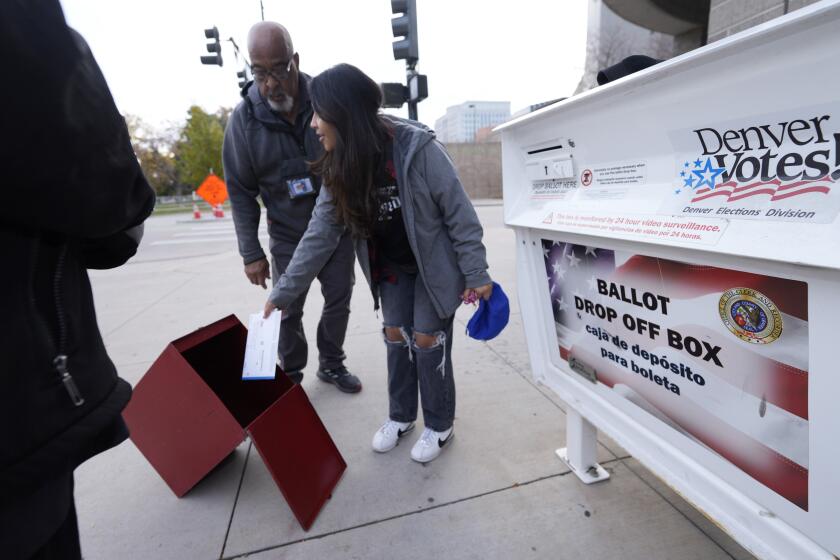Op-Ed: Gen Z’s lingo might be difficult to understand, but there’s a reason for that

- Share via
If you want to feel old and unhip, teach undergraduate students. Each year, while college professors age, fall out of step with fashion trends and stop signing up for new social media platforms, undergraduates remain as they always have been — youthful, energetic and not just aware of all the hip new trends but driving them.
These days, the majority of my undergraduate students are members of Gen Z, which means they were born between 1990 and 2010. While we can understand each other pretty well, they collectively speak a variety of English that is different from mine. And there are several explanations for this, some to do with how language works in general, and others to do with how Gen Z works in particular.
Dialects differ from one another on a number of linguistic levels: from the words people use to how they’re pronounced, and what grammatical patterns are followed. An example of this is whether or not a group uses the phrase, “I don’t need nothing.” Dialects have always tracked membership in social groups, or subcommunities, but they’ve traditionally been geographically anchored.
With the development of technologies that allow us to talk to one another across regional boundaries, language users are now regularly exposed to a variety of different dialects and can modulate their own language use to make it seem as though they are members of different social groups.
Gaslighting was named Merriam-Webster’s word of the year. People are searching for the word for two key reasons.
However, because of the development of the internet, and especially social media platforms like Twitter and TikTok, we are suddenly exposed to an unprecedented variety of linguistic variation. And any new linguistic innovation — especially if it’s made by someone with a substantial amount of social clout — can be almost instantaneously transmitted all over the world.
While new generations have always used slang to set themselves apart from previous ones, Gen Z’s slang use seems quantitatively different. There seems to be much more of it, and the life cycles of Gen Z slang terms seem much more abbreviated than their Gen X or Boomer counterparts. (Remember on fleek? Well, it’s over.)
Yet Gen Z slang is qualitatively similar to that of previous generations in being disproportionately sourced from Black and LGBTQ communities. This phenomenon is not specific to language. We see the same cultural appropriation in all varieties of self-expression, from dance to fashion. The use of the term “tea” to mean gossip, for instance, was allegedly first coined in the Black gay community decades ago.
But while it’s easy enough to substitute one synonymous word for another, a language user trying to appropriate slang from a dialect they are not fluent in is liable to run into trouble with words or grammatical patterns that don’t translate directly to their own dialect.
To the untrained ear, African American English (AAE) might sound like a less sophisticated version of White Mainstream English. But to linguists, AAE just follows a different set of rules, and in some cases can do things that Standard English cannot. It has a much richer aspectual system, for instance, marked in part by invariant “be” and “been.” This means that, while the Standard English statement “We knew” is ambiguous between “We recently found out” and “We have known for a long time,” the AAE statement “We been knew” is precisely, unambiguously habitual, carrying only the latter interpretation.
They’re shaping up to be a generation of practical swing voters.
And although this subtle semantic sophistication comes naturally to AAE community members and can be deciphered by trained linguists, it is likely to go undetected by people not immersed in the linguistic community. This can lead to an embarrassing backfiring of linguistic appropriation, revealing that a language user is in fact outside an influential community.
One of my undergraduate students drew my attention to a recent controversy on TikTok about the AAE word “finna.” One white woman used the word “finna” as if it were synonymous with the Standard English “going to,” and was criticized for using the term incorrectly. Another white woman came to her defense, arguing that her use was consistent with how the word is defined on Urban Dictionary.
But the natural — and powerful — response from a member of the AAE community is that mastery of a language or dialect requires being submersed in that dialect. Casual appropriators of the word have clearly missed its much more sophisticated meaning — impossible to translate directly into Standard English — as a modal expressing preferences rather than intentions about future events.
It is a great reminder that, while it’s nice to be able to curate our dialects for the purpose of self-expression, it’s incredibly important to be mindful of the sources of our turns of phrase, so we can do justice to their meaning and the contributions of the communities that created them.
Jessica Rett is a professor of linguistics at UCLA. Her research investigates the meaning of words and how they contribute to the meanings of sentences, either in isolation or in broader contexts.
More to Read
A cure for the common opinion
Get thought-provoking perspectives with our weekly newsletter.
You may occasionally receive promotional content from the Los Angeles Times.












